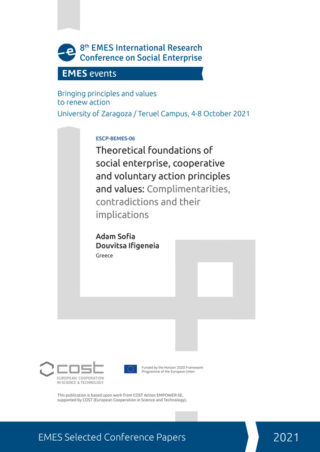Introduction
This article falls within the relevant literature on the definition and classification of social enterprises (SEs). It addresses the interrelation between definition criteria for social enterprises and legal forms adopted for their institutionalization. In particular, we analyze the existing legal person of Social Cooperative Enterprises in Greece in all its envisaged variants according to the three subsets of indicators developed by the EMES research network. The selection of social cooperatives lies in the centrality they often possess in the institutionalization process of social enterprises in many European countries.
First, we revisit the debate on the definition of social enterprises by endorsing their distinctive character as elaborated within the EMES research network. We transform the three subsets of indicators proposed by the EMES network (economic/entrepreneurial, social and participatory governance) into expected legal provisions for social enterprise legislation following the similar work of other scholars. In other words, we translate the three subsets of indicators into analytical axes and construct a typology of expected legal provisions included in each indicator. Second, we provide an overview of the context within which the new Law on Social and Solidarity Economy in Greece was adopted and offer a snapshot on the current status of registered actors. The main focus lies on the legal form of the Social Cooperative Enterprise. Therefore, in the third section we examine the provisions for this type of enterprise with the help provided by the analytical matrix matching the EMES sets of indicators with legal provisions. In the concluding section, we discuss the issues inherent in the difficult process of transforming definitions, principles and values into legal forms and provisions. More importantly, we highlight critical areas of dispute concerning the legal operationalization of definitions, principles and values.




